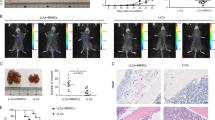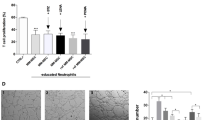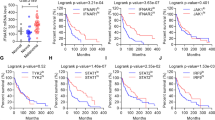Abstract
Bone marrow mesenchymal stem/stromal cells (BM-MSCs) can infiltrate into tumors and subsequently evolve into tumor resident MSCs in tumor microenvironment. In this study, using a mouse lymphoma model, we showed that the lymphoma resident MSCs (L-MSCs) are able to confer tumor-promoting property to the naïve cocultured BM-MSCs. Examination of cytokines and chemokines showed that post exposure to L-MSCs, BM-MSCs acquired an expression profile that is similar to that in L-MSCs. In vivo, BM-MSCs educated by L-MSCs (BM-L-MSCs) possess a greatly enhanced ability in promoting lymphoma growth. Consistent with an elevated CCL-2 expression in BM-L-MSCs, the tumor-promoting effect of BM-L-MSCs largely depends on CCR2-mediated macrophage recruitment to tumor sites. We further showed that the transmission of tumor-promoting effect is partially mediated by soluble factors. Our findings thus revealed a novel reinforcing mechanism in the maintenance of tumor microenvironment.
This is a preview of subscription content, access via your institution
Access options
Subscribe to this journal
Receive 50 print issues and online access
$259.00 per year
only $5.18 per issue
Buy this article
- Purchase on Springer Link
- Instant access to full article PDF
Prices may be subject to local taxes which are calculated during checkout



Similar content being viewed by others
Abbreviations
- BM-MSCs:
-
bone marrow-derived mesenchymal stromal cells
- L-MSCs:
-
lymphoma-derived mesenchymal stromal cells
- BM-L-MSCs:
-
BM-MSCs after coculture with L-MSCs
References
Hanahan D, Coussens LM . Accessories to the crime: functions of cells recruited to the tumor microenvironment. Cancer Cell 2012; 21: 309–322.
Karnoub AE, Dash AB, Vo AP, Sullivan A, Brooks MW, Bell GW et al. Mesenchymal stem cells within tumour stroma promote breast cancer metastasis. Nature 2007; 449: 557–563.
Ren G, Zhao X, Wang Y, Zhang X, Chen X, Xu C et al. CCR2-dependent recruitment of macrophages by tumor-educated mesenchymal stromal cells promotes tumor development and is mimicked by TNFalpha. Cell Stem Cell 2012; 11: 812–824.
Swartz MA, Iida N, Roberts EW, Sangaletti S, Wong MH, Yull FE et al. Tumor microenvironment complexity: emerging roles in cancer therapy. Cancer Res 2012; 72: 2473–2480.
Hanahan D, Weinberg RA . Hallmarks of cancer: the next generation. Cell 2011; 144: 646–674.
Mitra AK, Zillhardt M, Hua Y, Tiwari P, Murmann AE, Peter ME et al. MicroRNAs reprogram normal fibroblasts into cancer-associated fibroblasts in ovarian cancer. Cancer Discov 2012; 2: 1100–1108.
Erez N, Truitt M, Olson P, Arron ST, Hanahan D . Cancer-associated fibroblasts are activated in incipient neoplasia to orchestrate tumor-promoting inflammation in an NF-kappaB-dependent manner. Cancer Cell 2010; 17: 135–147.
Grivennikov SI, Greten FR, Karin M . Immunity, inflammation, and cancer. Cell 2010; 140: 883–899.
Studeny M, Marini FC, Dembinski JL, Zompetta C, Cabreira-Hansen M, Bekele BN et al. Mesenchymal stem cells: potential precursors for tumor stroma and targeted-delivery vehicles for anticancer agents. J Natl Cancer Inst 2004; 96: 1593–1603.
Spaeth EL, Dembinski JL, Sasser AK, Watson K, Klopp A, Hall B et al. Mesenchymal stem cell transition to tumor-associated fibroblasts contributes to fibrovascular network expansion and tumor progression. PLoS One 2009; 4: e4992.
Kabashima-Niibe A, Higuchi H, Takaishi H, Masugi Y, Matsuzaki Y, Mabuchi Y et al. Mesenchymal stem cells regulate epithelial-mesenchymal transition and tumor progression of pancreatic cancer cells. Cancer Sci 2013; 104: 157–164.
McLean K, Gong Y, Choi Y, Deng N, Yang K, Bai S et al. Human ovarian carcinoma-associated mesenchymal stem cells regulate cancer stem cells and tumorigenesis via altered BMP production. J Clin Invest 2011; 121: 3206–3219.
Li HJ, Reinhardt F, Herschman HR, Weinberg RA . Cancer-stimulated mesenchymal stem cells create a carcinoma stem cell niche via prostaglandin E2 signaling. Cancer Discov 2012; 2: 840–855.
Djouad F, Plence P, Bony C, Tropel P, Apparailly F, Sany J et al. Immunosuppressive effect of mesenchymal stem cells favors tumor growth in allogeneic animals. Blood 2003; 102: 3837–3844.
Goldstein RH, Reagan MR, Anderson K, Kaplan DL, Rosenblatt M . Human bone marrow-derived MSCs can home to orthotopic breast cancer tumors and promote bone metastasis. Cancer Res 2010; 70: 10044–10050.
Guilloton F, Caron G, Menard C, Pangault C, Ame-Thomas P, Dulong J et al. Mesenchymal stromal cells orchestrate follicular lymphoma cell niche through the CCL2-dependent recruitment and polarization of monocytes. Blood 2012; 119: 2556–2567.
Mantovani A, Allavena P, Sica A, Balkwill F . Cancer-related inflammation. Nature 2008; 454: 436–444.
Ren G, Zhang L, Zhao X, Xu G, Zhang Y, Roberts AI et al. Mesenchymal stem cell-mediated immunosuppression occurs via concerted action of chemokines and nitric oxide. Cell Stem Cell 2008; 2: 141–150.
Acknowledgements
This work was supported by grants from National Institutes of Health of the United States of America (GM866889, DE014913, DE019932 and ES005022), Ministry of Science and Technology of China (2010CB945600 and 2011DFA30630) and a grant from the Human Genetics Institute of New Jersey. We would also like to thank the Robert Wood Johnson Foundation (Grant 67038) for their support of the Child Health Institute of New Jersey.
Author contributions
GR and YL designed the research, collected data, analyzed and interpreted data and drafted the manuscript. XZ, JZ, BZ, YZ, LZ and XQ collected data, analyzed and interpreted data. JT, CS and YS designed the research, analyzed and interpreted data, and drafted the manuscript.
Author information
Authors and Affiliations
Corresponding authors
Ethics declarations
Competing interests
The authors declare no conflict of interest.
Additional information
Supplementary Information accompanies this paper on the Oncogene website
Rights and permissions
About this article
Cite this article
Ren, G., Liu, Y., Zhao, X. et al. Tumor resident mesenchymal stromal cells endow naïve stromal cells with tumor-promoting properties. Oncogene 33, 4016–4020 (2014). https://doi.org/10.1038/onc.2013.387
Received:
Revised:
Accepted:
Published:
Issue Date:
DOI: https://doi.org/10.1038/onc.2013.387
Keywords
This article is cited by
-
Targeting the tumor stroma for cancer therapy
Molecular Cancer (2022)
-
Rat Adipose-Derived Stromal Cells (ADSCs) Increases the Glioblastoma Growth and Decreases the Animal Survival
Stem Cell Reviews and Reports (2022)
-
Tumor microenvironment promotes breast cancer chemoresistance
Cancer Chemotherapy and Pharmacology (2021)
-
Tumor-resident adenosine-producing mesenchymal stem cells as a potential target for cancer treatment
Clinical and Experimental Medicine (2021)
-
Reversibility of hAT-MSCs phenotypic and metabolic changes after exposure to and withdrawal from HCC-conditioned medium through regulation of the ROS/MAPK/HIF-1α signaling pathway
Stem Cell Research & Therapy (2020)



